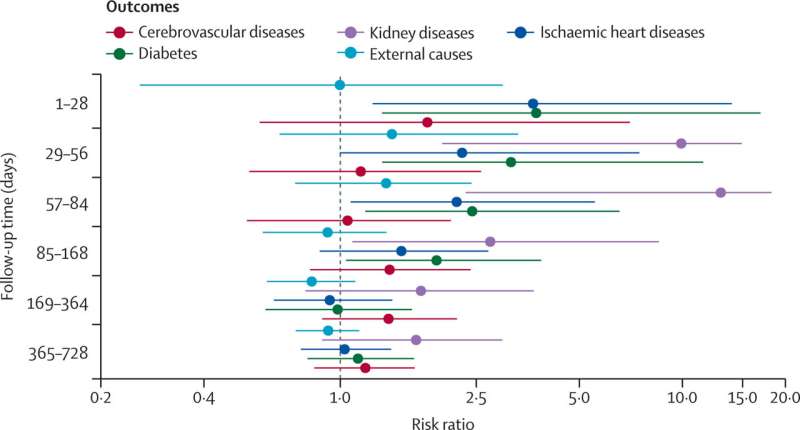This article has been reviewed according to Science X's editorial process and policies. Editors have highlighted the following attributes while ensuring the content's credibility:
fact-checked
trusted source
proofread
Risk of death from chikungunya continues for up to three months, finds analysis

People infected with the chikungunya virus (CHIKV) still have an increased risk of death from complications for up to three months post-infection, according to new research published in The Lancet Infectious Diseases.
Chikungunya is a viral disease transmitted by mosquitoes to humans. Most commonly, the virus is transmitted by Aedes aegypti and Aedes albopictus mosquitoes, more commonly known as yellow fever and tiger mosquitoes, respectively.
The name chikungunya derives from a word in the Kimakonde language meaning "to become contorted," relating to the severe joint pain and fever associated with infection. While most patients recover fully, chikungunya disease can prove fatal. Despite infections going largely unreported, approximately 500,000 cases and over 400 deaths were recorded worldwide in 2023.
The study team, including researchers from the London School of Hygiene & Tropical Medicine (LSHTM), analyzed almost 150,000 recorded chikungunya infections using data from the 100 Million Brazilian Cohort.
The findings show that people infected with the virus are still at risk from complications even after the period of acute infection ends, which typically lasts for 14 days post-symptom onset. In the first week, infected individuals were eight times more likely to die than unexposed individuals. They were still twice as likely to die from complications at three months post-infection.
The authors found that patients had an increased risk of death through cardiovascular conditions, such as ischemic heart disease and metabolic and kidney diseases, independent of age group and sex.
Aedes-borne diseases are anticipated to increase in frequency and location due to climate change, urbanization, and heightened human mobility. As such, chikungunya disease is now seen as a growing threat to public health.
There are currently no medications available to prevent chikungunya or specific treatments post-infection. However, the world's first vaccine was approved by the US Food and Drug Administration in November 2023.
Dr. Enny Da Paixao Cruz, Associate Professor at LSHTM and senior author of the study, said, "With chikungunya infections expected to increase, it's important that health services consider the risks that persist even after the acute phase of infection has ended."
"This study highlights a pressing need for continued research and development of effective anti-chikungunya therapeutics and equitable access to approved vaccines in countries with recurring outbreaks."
"Reinforcing measures to control the spread of chikungunya virus-carrying mosquitoes is also essential for reducing the excess mortality associated with the disease."
More information: Thiago Cerqueira-Silva et al, Risk of death following chikungunya virus disease in the 100 Million Brazilian Cohort, 2015–18: a matched cohort study and self-controlled case series, The Lancet Infectious Diseases (2024). DOI: 10.1016/S1473-3099(23)00739-9




















